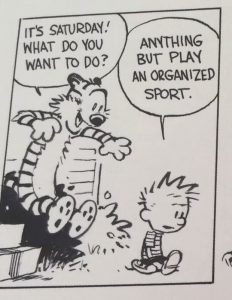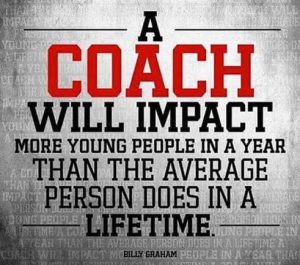This post is from B. Joe Eldridge, who has great insight as a youth sport coach over several decades. This is a very emotional topic and one that we are very passionate about. The youth sports experience has seen better days, to say the least. We care too much to let it keep going and will be publishing more on this subject in the future. If you agree that the Youth Sports Machine needs some serious change, please let us know your level of interest as we put together a group of like-minded individuals to help facilitate change. Thank you for your support.
Do I think coaching youth sports has changed since I started coaching in the 70’s? The short answer is: I think coaching youth sports has become more challenging. Before I expand on that thought, I should provide some background about myself. In my youth I played a variety of sports but mainly soccer, track, football and cricket (I lived in England for three years). As my own children grew, I volunteered to coach and ultimately got involved organizing a local soccer league. To help in that endeavor, I joined a national soccer organization where I was trained as an instructor. Ultimately I was asked to join the national staff and for the next 30 years I traveled extensively across the country teaching volunteer moms and dads how to coach, referee and administer soccer programs. Additionally, I continued to coach and referee at all levels of youth soccer including High School and College. I retired in 2009.
Enough about me… back to why I think coaching youth sports is more challenging than it used to be. First of all, it takes more effort to  become a youth sports coach than it used to. We used to let anyone coach who would volunteer their time. We are not so trusting these days and reputable youth sports programs often require background checks, training and certification before we consider selecting someone as a youth sport coach. Youth sports have become much more organized and available than in the past which means coaches have more competition with other sports to attract and retain young players. In my day, baseball was the only organized game in town for kids, whereas today it’s possible for kids to be involved in a different organized sport every day of the week. Also, coach knowledge of the sport is no longer enough, they must now also have knowledge of exercise physiology and child development. I shudder to think of some of things I had kids doing for conditioning when I first started coaching only to later learn how they were detrimental to young growing bodies. An awareness of concerns for the emotional and physiological well-being of youth is also required of coaches today to recognizing the effectiveness of and differences between intrinsic and extrinsic motivational techniques (kids don’t respond to critique in the same way professional athletes do).
become a youth sports coach than it used to. We used to let anyone coach who would volunteer their time. We are not so trusting these days and reputable youth sports programs often require background checks, training and certification before we consider selecting someone as a youth sport coach. Youth sports have become much more organized and available than in the past which means coaches have more competition with other sports to attract and retain young players. In my day, baseball was the only organized game in town for kids, whereas today it’s possible for kids to be involved in a different organized sport every day of the week. Also, coach knowledge of the sport is no longer enough, they must now also have knowledge of exercise physiology and child development. I shudder to think of some of things I had kids doing for conditioning when I first started coaching only to later learn how they were detrimental to young growing bodies. An awareness of concerns for the emotional and physiological well-being of youth is also required of coaches today to recognizing the effectiveness of and differences between intrinsic and extrinsic motivational techniques (kids don’t respond to critique in the same way professional athletes do).
The most significant challenge for coaches in youth sports today from years gone by is, in a word – PARENTS – or overzealous and ill-informed adults. Youth sports coaches must deal with player parents who have developed preconceived notions and behavior from watching professional sports which are not appropriate for youth sports. Over time, Americans have become more and more obsessed with sports. You might say we are sports fanatics! Not surprisingly, this has resulted in huge sums of money paid professional athletes and generated by sports organizations, schools and colleges. With the money has come some not so positive changes in adult behavior about sports, particularly when viewed through the impressionable young eyes in youth sports. The will to win has been replaced by the need to win in professional sports, and just about anything goes to achieve that ultimate goal… winning!
Many of the old fashioned values associated with sports in the past have taken a back seat to winning. The values of sportsmanship, fair play, respect for opponents and for authority, honesty and humility are now challenged by “in your face trash talk”, childish temper tantrums, open criticism of officials, excessive celebrator demonstrations for minor successes and a general lack of humility. The average red blooded American sports fan attending a sporting event is mostly concerned with their own amusement, including criticizing or trash talking players, ridiculing the officials or in general just behaving in an outrageous manner. So, when they bring this behavior and attitude to youth sports, it is out of place and destructive to the kids who don’t understand why mom and dad are being so negative and spoiling everyone’s fun.
How inappropriate would it be for mom and dad, while attending their child’s music recital, school play, spelling bee or other such activity, to shout critical and derogatory comments during the performance? Support and encouragement is what young players need, so they will continue to participate and to learn. The pressure to succeed will come soon enough in their lives, without mom and dad speeding up the process. We should let them enjoy their youth and share in their enthusiasm for just playing a game.
For the overwhelming majority of youth sports players, sport is not about the end product of winning, but rather it’s all about the process of playing the game and having fun. Winning is not a dirty word. The object of any game is to do your best to win, but the purpose of playing games at the youth level is to enjoy the process. Think back to when you were a kid and the games you liked to play whether it was stick ball in the street, basketball in the driveway or football in the backyard. Can you remember playing for hours and hours and the score might be overwhelmingly in favor of your opponent but you kept on playing because it was fun? Can you remember it getting dark or your Mom calling you for dinner and how many times did someone keep saying, “OK, next goal wins?” so you could squeeze in every last minute of playing time? It was all about the process of playing not about the end result of who wins!
Too often player parents fail to recognize that the behavior and attitudes common in professional sports have no place in youth sports. The “in your face” mentality, open criticism of officials or opposing players and an excessive emphasis on winning in professional sports have made coaching youth sports so much more challenging than it used to be. Years ago the coaches job mainly involved teaching players; how to play the game, respect for opponents and officials, the importance of sportsmanship, doing your best and how to win and lose as true sportsmen. Today coaches must now also “coach” the player parents to make them aware of the critical role they play in contributing to the overall “success” of the sports experience for their child and indeed for everyone involved.
The coach’s job in “educating” player parents on the differences between youth and professional sports and their role in helping their child have a successful and worthwhile experience is both sensitive and difficult. Hopefully, help in this task is available from the sponsoring sports organization in the form of parent meetings, signs and literature addressing the topic and support from more knowledgeable and informed parents (peer pressure). It only takes one or two misguided parents to spoil the experience for everyone involved. One of the worst things a coach can do when presented with inappropriate behavior from players or parents is to ignore it. If inappropriate comments or behavior goes unaddressed this silence gives tacit “permission” for more of the same. It may not be easy, but ultimately it’s the coach’s job to set the example of what is and is not acceptable behavior for players and parents alike.
It’s important to be clear about what is considered “success” in a youth sports program. Is the primary goal of a successful youth sports
program to develop a winning team or to contribute to the positive development of youth? Hopefully most would agree it’s the latter. The additional challenge coaches have today which was not such an issue years ago is that somehow they must convince the player parents they should let the coaches coach, the referees referee and that mom and dad’s job is to support and encourage the young players to enjoy the process of playing a game without external pressure or criticism whether or not they are winning.

It’s a great ride and it goes by fast, so we should enjoy every minute and remember that…
In Youth Sports, It’s About More Than The Game!

